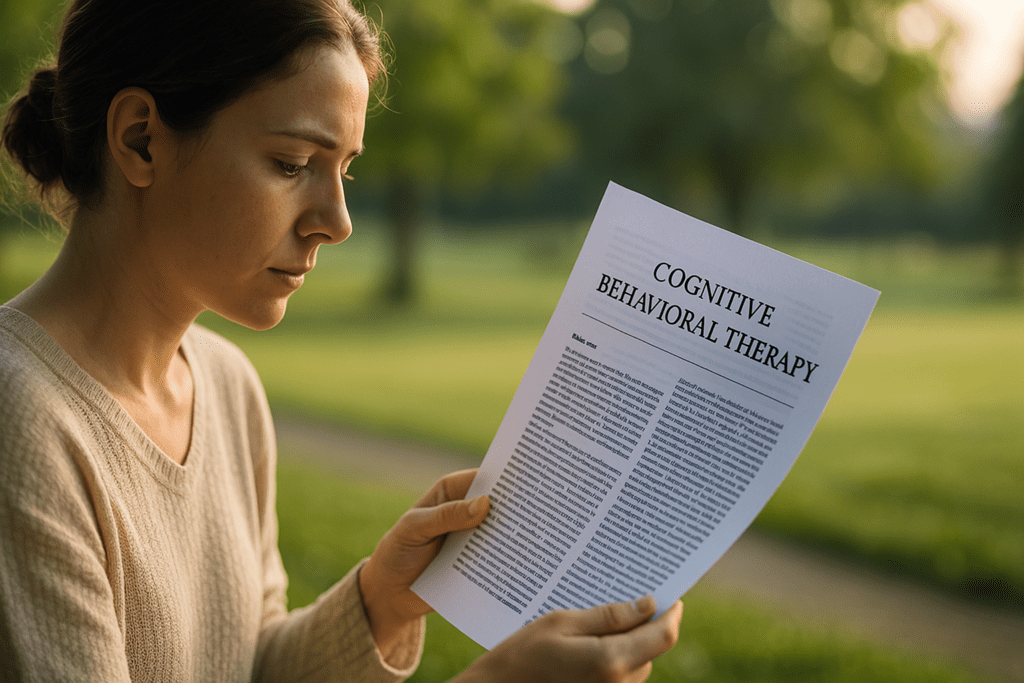In recent years, cognitive behavioral therapy (CBT) has increasingly gained recognition as one of the most effective and evidence-backed approaches to treating a range of psychological disorders. As new research continues to emerge, cognitive behavioral therapy scholarly articles are deepening our understanding of how this therapeutic model impacts mental health and stress management. For health professionals, students, and those navigating mental health concerns, exploring these findings offers valuable insight into the evolving landscape of psychological care. Notably, CBT has demonstrated consistent efficacy not just in clinical trials but across diverse populations, cultures, and conditions. This growing body of evidence reveals both the strengths and limitations of CBT, providing a nuanced perspective that goes far beyond the basics of traditional therapeutic outcomes.
You may also like: How Does CBT Work to Improve Relationships and Communication? Science-Backed Techniques for Getting Along with Others
The Foundations of Cognitive Behavioral Therapy in Scientific Research
Cognitive behavioral therapy is built on the premise that thoughts, feelings, and behaviors are interconnected, and by identifying and modifying negative thought patterns, individuals can improve emotional regulation and behavior. Over the past few decades, CBT articles in peer-reviewed journals have emphasized the structured, goal-oriented nature of this approach, making it highly suitable for empirical study. Unlike less structured forms of therapy, CBT lends itself well to randomized controlled trials and statistical evaluation, which has significantly contributed to its prominence in clinical psychology literature.
Recent cognitive behavioral therapy research has explored both short-term and long-term outcomes of treatment across conditions such as generalized anxiety disorder, depression, PTSD, and obsessive-compulsive disorder. The methodology and design of these cognitive behavioral therapy peer reviewed articles typically involve standardized symptom checklists, therapist adherence metrics, and follow-up assessments over six months to several years. These rigorous standards have allowed researchers to assess the durability of CBT’s impact and how it compares to alternative treatments such as medication, psychodynamic therapy, and mindfulness-based interventions.
What Recent CBT Scholarly Articles Say About Its Efficacy for Stress
One of the most frequently explored areas in recent cognitive behavioral therapy scholarly articles is the efficacy of CBT for managing acute and chronic stress. Cognitive therapy for stress focuses on identifying cognitive distortions, such as catastrophizing or all-or-nothing thinking, and teaching individuals to reframe these patterns in a more realistic and adaptive way. The latest cognitive therapy research indicates that even brief CBT interventions can significantly reduce perceived stress levels, particularly in high-pressure populations such as healthcare workers, college students, and corporate employees.
A series of cognitive behavioral therapy articles published in major psychological journals between 2021 and 2024 confirmed that structured CBT sessions led to a measurable reduction in cortisol levels and improvements in self-reported stress resilience. These findings were consistent across in-person and online formats, indicating the adaptability of CBT in modern delivery systems. Furthermore, cognitive behavioral therapy statistics from these studies show that stress-related symptoms such as insomnia, irritability, and physical tension improved more substantially in CBT participants compared to control groups receiving only psychoeducation or supportive counseling.
CBT’s Effectiveness for Anxiety, Depression, and Co-Occurring Conditions
CBT has long been considered a first-line treatment for anxiety and depression, but recent cognitive behavioral therapy journal articles PDF available through academic databases provide more detailed analysis of its mechanisms and effectiveness. One key insight is the identification of transdiagnostic processes—underlying thought patterns that contribute to multiple conditions. For example, a tendency toward rumination not only exacerbates depression but also contributes to social anxiety and panic disorder. By targeting these shared mechanisms, CBT has demonstrated broad applicability across mental health diagnoses.
The cognitive behavioral therapy efficacy data outlined in the latest CBT scholarly articles highlights its ability to produce moderate-to-large effect sizes, particularly in structured, manualized programs. In meta-analyses synthesizing data from over 300 trials, CBT consistently outperformed waitlist controls and performed on par with or better than pharmacological treatments for many patients. Moreover, emerging research emphasizes the importance of personalization within CBT frameworks. When interventions are tailored to individual cognitive profiles and cultural contexts, outcomes improve substantially—a point that underscores the importance of therapist training and cultural competence.

Insights from Cognitive Behavioral Therapy Peer Reviewed Articles on Neurobiological Outcomes
Beyond symptom reduction, cognitive behavioral therapy research has begun to uncover neurobiological changes associated with CBT interventions. Neuroimaging studies cited in recent cognitive behavioral therapy scholarly articles reveal that CBT may lead to increased activity in the prefrontal cortex—an area associated with executive function and emotion regulation—while decreasing activity in the amygdala, the brain’s fear center. These findings suggest that CBT doesn’t just change how people think; it may physically alter the brain’s stress-response circuitry.
These insights align with what cognitive behavioral therapy peer reviewed articles have described as neurocognitive retraining. When patients repeatedly practice cognitive restructuring, exposure, and behavioral activation, their neural pathways begin to reflect these changes. This biological reinforcement of new coping strategies may explain why CBT has such enduring effects, even after therapy ends. Importantly, this neurobiological data adds a layer of legitimacy to CBT, helping to cement its status as a scientifically grounded and medically credible intervention.
Cross-Cultural Validity and Adaptation in Cognitive Behavioral Therapy Articles
A growing theme in cognitive behavioral therapy scholarly articles is the cross-cultural applicability of CBT across different racial, ethnic, and linguistic groups. Earlier criticisms suggested that CBT was overly Westernized, relying on individualistic values and cognitive frameworks that may not resonate globally. However, updated CBT articles demonstrate that when CBT principles are adapted to include culturally relevant metaphors, values, and practices, the therapy retains its efficacy across diverse settings.
For example, in cognitive therapy research involving refugees and immigrants, incorporating storytelling and collective identity into treatment improved both engagement and outcomes. Additionally, translation of CBT materials and the use of bilingual therapists helped address language barriers that previously limited access to care. These findings underscore the importance of inclusivity and adaptability in mental health interventions, and they reinforce the relevance of cognitive behavioral therapy peer reviewed articles in global health discussions.
The Role of Digital CBT Platforms: What CBT Articles Reveal
As digital health tools continue to evolve, the role of internet-based and app-supported CBT has expanded significantly. According to cognitive behavioral therapy articles published in 2023 and 2024, online CBT programs produce outcomes comparable to in-person therapy for many users, particularly for mild to moderate depression and generalized anxiety. These digital formats often include interactive worksheets, guided video modules, and real-time messaging with therapists—all features grounded in traditional CBT principles.
This shift has allowed for broader dissemination of CBT in underserved communities, especially during times of limited in-person care such as the COVID-19 pandemic. The latest cognitive behavioral therapy statistics show high user satisfaction and reduced dropout rates when digital CBT is paired with occasional live sessions. However, scholarly articles caution that while digital tools increase accessibility, they may not be suitable for individuals with severe or complex psychiatric conditions who require more intensive support.
Integrating CBT with Other Evidence-Based Therapies
Although CBT remains a robust standalone intervention, many clinicians are now exploring integrative approaches. Cognitive behavioral therapy scholarly articles increasingly report on CBT being combined with other modalities, such as acceptance and commitment therapy (ACT), dialectical behavior therapy (DBT), and mindfulness-based cognitive therapy (MBCT). These hybrid models aim to enhance the depth and flexibility of CBT, addressing areas where traditional methods may fall short.
For instance, while CBT focuses on changing thoughts, ACT emphasizes acceptance of thoughts without judgment. When integrated, these two frameworks can offer a more nuanced and compassionate approach to mental health. Similarly, DBT adds emotion regulation and distress tolerance skills that complement CBT’s cognitive focus. This integrative movement is supported by cognitive behavioral therapy peer reviewed articles that emphasize both innovation and fidelity—ensuring that core CBT techniques are preserved even as new elements are added.
Challenges and Limitations: A Balanced View from Cognitive Behavioral Therapy Research
Despite its well-documented success, CBT is not a panacea. A critical reading of cognitive behavioral therapy research reveals several limitations worth considering. First, not all individuals respond to CBT equally. Factors such as treatment resistance, comorbid personality disorders, or lack of insight can diminish therapeutic outcomes. Furthermore, some studies suggest that CBT may not address the root causes of distress in cases involving complex trauma or deeply ingrained relational patterns.
Cognitive behavioral therapy scholarly articles also point out challenges related to therapist training and fidelity. Inconsistent implementation of CBT protocols can lead to variable outcomes, highlighting the importance of supervision, certification, and ongoing education. Additionally, there is an ongoing debate about the overemphasis on symptom reduction as the primary outcome measure. Some researchers argue that broader measures—such as quality of life, social functioning, and emotional literacy—should receive more attention in CBT efficacy studies.
Implications for Mental Health Policy and Future Research
The robust findings from cognitive behavioral therapy scholarly articles have significant implications for mental health policy, particularly in the context of expanding access to evidence-based care. Many national health systems, including those in the U.S., U.K., and Australia, have incorporated CBT into public mental health initiatives. Insurance coverage and reimbursement policies increasingly reflect the proven efficacy of CBT, especially when supported by strong cognitive behavioral therapy statistics.
Looking ahead, future research will likely focus on refining CBT for specific subpopulations, such as neurodiverse individuals, adolescents, and older adults. There is also growing interest in leveraging artificial intelligence and machine learning to personalize CBT interventions in real-time. By combining clinical expertise with data-driven insights, researchers aim to optimize the delivery and impact of CBT across varied settings. The continued publication of cognitive behavioral therapy journal articles PDF resources will play a crucial role in disseminating these innovations to practitioners, policymakers, and educators.

Frequently Asked Questions: Cognitive Behavioral Therapy and Its Evidence-Based Applications
1. How do cognitive behavioral therapy scholarly articles influence clinical decision-making in modern psychology?
Cognitive behavioral therapy scholarly articles are instrumental in shaping clinical protocols, especially within evidence-based care systems. These peer-reviewed studies guide therapists in selecting specific techniques that are most effective for particular disorders or demographics. For example, cognitive behavioral therapy research often reveals subtle distinctions in how certain populations respond to exposure therapy versus cognitive restructuring, enabling tailored interventions. Moreover, CBT scholarly articles frequently emphasize the importance of measuring progress using validated outcome metrics, which clinicians incorporate into regular practice. These publications also serve as educational tools, keeping mental health professionals current on evolving methods, including digital applications of CBT and culturally responsive adaptations.
2. What new trends are emerging in cognitive behavioral therapy research that are not yet mainstream in clinical settings?
One emerging trend involves the integration of virtual reality into CBT protocols, particularly for phobias and PTSD. Cognitive behavioral therapy articles have begun exploring how immersive environments can simulate anxiety-inducing stimuli in a controlled, therapeutic manner. Another underutilized area is the use of machine learning to personalize CBT programs in real-time, drawing on patient data to suggest optimal interventions. Additionally, some recent cognitive behavioral therapy peer reviewed articles examine the efficacy of micro-sessions—brief, focused CBT interventions delivered throughout the day rather than during traditional hour-long appointments. These innovations highlight how cognitive behavioral therapy scholarly articles often lead the way in predicting future directions for mental health care.
3. How do cognitive behavioral therapy statistics inform public health policy and funding decisions?
Cognitive behavioral therapy statistics play a pivotal role in mental health policy formulation by demonstrating the treatment’s cost-effectiveness, scalability, and long-term benefits. Policymakers rely on these data to allocate funding toward interventions that offer the greatest return on investment in terms of symptom reduction and improved quality of life. For instance, studies cited in cognitive behavioral therapy scholarly articles have shown that patients receiving CBT are less likely to require hospitalization or emergency psychiatric care, reducing healthcare costs. These findings have led to broader insurance coverage for CBT-based treatments and inclusion in national mental health strategies. Moreover, CBT statistics are often used to assess health equity, determining whether diverse populations benefit equally from the therapy and informing strategies for more inclusive service delivery.
4. What role do cognitive behavioral therapy journal articles PDF resources play in academic training and continuing education?
Access to cognitive behavioral therapy journal articles PDF formats is essential for psychology students and licensed professionals seeking continuing education. These easily downloadable documents enable flexible learning, often supporting coursework, thesis development, or board certification study. In academic settings, professors integrate recent CBT articles into syllabi to expose students to cutting-edge findings and methodologies. Beyond the classroom, practitioners use these resources to stay up-to-date on therapeutic advancements, particularly when new cognitive behavioral therapy peer reviewed articles introduce revised treatment manuals or address complex cases. The availability of open-access cognitive behavioral therapy scholarly articles in PDF form has helped bridge the gap between academia and clinical practice, allowing real-time knowledge translation.
5. Are there specific populations for whom cognitive therapy for stress shows higher or lower effectiveness?
Cognitive therapy for stress has proven especially effective in populations with high cognitive insight and motivation for change, such as university students, medical professionals, and individuals in high-performance occupations. Cognitive behavioral therapy research suggests that these groups benefit significantly from structured interventions due to their responsiveness to cognitive reframing and behavioral activation. Conversely, individuals with comorbid intellectual disabilities, severe psychotic disorders, or traumatic brain injuries may experience reduced benefits from standard CBT approaches. However, new cognitive behavioral therapy articles indicate that modified versions of CBT—featuring simplified language and enhanced visual aids—can still yield positive outcomes in these populations. These findings from recent cognitive behavioral therapy scholarly articles underscore the importance of flexibility and individualization in therapeutic design.
6. What practical insights can be drawn from lesser-known CBT articles on therapist-client dynamics?
CBT articles that delve into therapist-client dynamics reveal critical nuances often overlooked in mainstream training. One such insight is the impact of therapist self-disclosure, which, when used sparingly and strategically, can enhance rapport and model vulnerability. Another important takeaway involves the concept of cognitive empathy, where therapists not only validate emotional experiences but also help clients accurately label their thought patterns—a skill rooted in metacognition. Cognitive behavioral therapy peer reviewed articles have also begun to explore how therapist burnout can subtly influence session effectiveness, particularly in high-volume clinical environments. Understanding these relational dynamics, as highlighted in cognitive behavioral therapy scholarly articles, helps practitioners cultivate a therapeutic alliance that enhances client engagement and long-term adherence.
7. How are cognitive behavioral therapy scholarly articles shaping digital mental health innovations?
The intersection of digital health and CBT is increasingly shaped by cognitive behavioral therapy scholarly articles that evaluate and validate emerging technologies. For example, CBT articles examining chatbot-based therapy platforms assess variables like user satisfaction, dropout rates, and symptom improvement. Cognitive behavioral therapy peer reviewed articles also explore how mobile apps use behavioral nudges and gamification to reinforce therapeutic goals between sessions. Moreover, new cognitive behavioral therapy research has started to investigate the use of biometric data—such as heart rate variability or skin conductance—to dynamically adjust CBT modules. These developments reflect a shift toward hybrid care models, where insights from CBT scholarly articles directly inform the architecture of mental health technologies.
8. What do recent cognitive behavioral therapy statistics say about long-term relapse prevention?
Recent cognitive behavioral therapy statistics demonstrate promising outcomes in relapse prevention, particularly for mood and anxiety disorders. Follow-up studies reported in cognitive behavioral therapy peer reviewed articles show that individuals who complete full CBT programs maintain significant symptom reduction up to five years post-treatment. A key factor contributing to these outcomes is the skill-based nature of CBT, which equips clients with cognitive and behavioral tools they can continue to use independently. Some CBT scholarly articles also point to the importance of booster sessions, often delivered quarterly or biannually, to refresh core strategies and prevent regression. Additionally, cognitive behavioral therapy articles highlight the predictive value of early symptom change, noting that clients who show improvement within the first few sessions are more likely to sustain gains over time.
9. How do cultural values influence the interpretation of cognitive behavioral therapy scholarly articles?
Cultural context significantly affects how findings in cognitive behavioral therapy scholarly articles are interpreted and applied. In collectivist societies, for example, the emphasis on individual cognitive autonomy in CBT may be reframed to include communal perspectives, a shift supported by culturally responsive cognitive behavioral therapy research. Some cognitive behavioral therapy articles suggest incorporating indigenous healing practices or family-based interventions to improve relevance and engagement. Additionally, translations of cognitive behavioral therapy journal articles PDF materials must consider not only language but also idiomatic expressions and metaphors to retain therapeutic meaning. These adaptations are critical, as cognitive behavioral therapy efficacy can vary significantly depending on cultural alignment, highlighting the importance of inclusive and culturally aware scholarship.
10. What role do micro-level cognitive behavioral therapy statistics play in refining therapeutic strategies?
While macro-level data often dominate public discourse, micro-level cognitive behavioral therapy statistics—such as moment-to-moment mood ratings or session-by-session progress scores—offer granular insights into treatment effectiveness. These data points allow therapists to adjust strategies in real time, optimizing each session based on client responsiveness. CBT scholarly articles increasingly encourage the use of ecological momentary assessment (EMA) tools, which capture fluctuations in emotion and cognition throughout the day. Such tools provide a dynamic picture of how clients are applying CBT techniques outside of therapy, helping practitioners identify barriers or accelerators to progress. These micro-level findings enrich the broader cognitive behavioral therapy research landscape by bringing precision and personalization to clinical decision-making.

Conclusion: What the Science Says About Cognitive Behavioral Therapy Efficacy and Its Role in Stress Relief
As cognitive behavioral therapy continues to evolve, the latest CBT scholarly articles offer compelling evidence of its efficacy across a broad range of mental health conditions. From cognitive behavioral therapy for stress and anxiety to its expanding use in digital and cross-cultural contexts, CBT remains a cornerstone of modern psychological care. The consistency of findings in cognitive behavioral therapy peer reviewed articles, along with the physiological data from neuroimaging and biometrics, provides a strong foundation for its continued use and adaptation.
Importantly, cognitive behavioral therapy research does not paint a picture of a one-size-fits-all solution. Instead, it highlights a dynamic and evolving practice that can be tailored to individual needs, cultural backgrounds, and comorbid conditions. The most promising outcomes are seen when CBT is delivered with fidelity, customized with cultural sensitivity, and supported by ongoing empirical evaluation. Whether accessed through traditional therapy, digital platforms, or integrative modalities, CBT offers a scientifically validated path to greater mental resilience and emotional well-being.
For those seeking to understand and address stress through evidence-based methods, the growing library of cognitive behavioral therapy scholarly articles offers not only hope but a practical roadmap. As more cognitive behavioral therapy journal articles PDF resources become available to the public, professionals and individuals alike can benefit from the deep well of knowledge shaping today’s mental health landscape.
therapy for anxiety relief, evidence-based mental health treatment, stress reduction techniques, psychological resilience strategies, neuroscience of therapy, mental health coping skills, trauma-informed therapy, behavioral intervention methods, anxiety and depression support, digital mental health tools, online therapy platforms, long-term mental wellness, emotional regulation techniques, personalized mental health care, cognitive restructuring methods, psychological therapy innovations, therapist training standards, mental health outcome measures, psychotherapy best practices, mental health education resources
Further Reading:
Cognitive Behavior Therapy – StatPearls
Long-term effectiveness of cognitive behavioral therapy
The Effectiveness of Cognitive-Behavioral Therapy
Disclaimer
The information contained in this article is provided for general informational purposes only and is not intended to serve as medical, legal, or professional advice. While Health11News strives to present accurate, up-to-date, and reliable content, no warranty or guarantee, expressed or implied, is made regarding the completeness, accuracy, or adequacy of the information provided. Readers are strongly advised to seek the guidance of a qualified healthcare provider or other relevant professionals before acting on any information contained in this article. Health11News, its authors, editors, and contributors expressly disclaim any liability for any damages, losses, or consequences arising directly or indirectly from the use, interpretation, or reliance on any information presented herein. The views and opinions expressed in this article are those of the author(s) and do not necessarily reflect the official policies or positions of Health11News.


